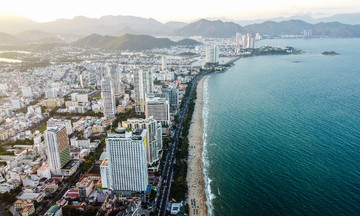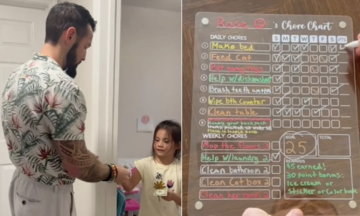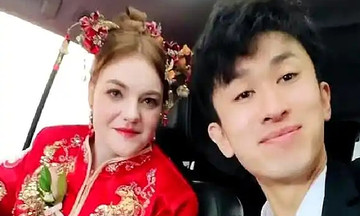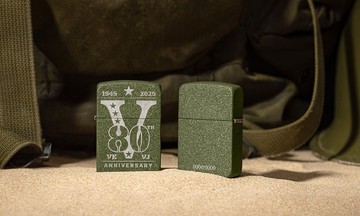Mr. Cac, from Son Dong village, Hoang Van commune, Bac Ninh province, is a veteran who served across battlefields in North and South Vietnam, Laos, and Cambodia from 1965 to 1988. He is also a fourth-class wounded veteran and former training officer at Military Zone 9's Officer School.
Having missed the parade in Ho Chi Minh City on the 50th anniversary of national reunification (30/4), Mr. Cac is resolved to be in Hanoi on September 2nd. "I must go to see our nation's strength and to report to my fallen comrades," he told his daughter.
Aware that her father doesn't have a ticket to Ba Dinh Square for the main ceremony, Minh Yen fears his health won't withstand the crowded sidewalks under the scorching 38-40°C heat. "My father is elderly and a wounded veteran; he certainly can't endure the jostling of tens of thousands of people," she said.
Her family explored numerous options, frantically searching for hotel rooms or cafes overlooking the parade route, but to no avail. Prime viewing spots were sold out long ago. The few remaining options were exorbitantly priced without guaranteeing escape from the chaos.
Desperate, Yen sought advice online from Hanoi residents. However, the elderly veteran refused to let his daughter ask for favors. "I can't exploit my veteran status to make demands. I'll watch the ceremony like everyone else," Mr. Cac stated.
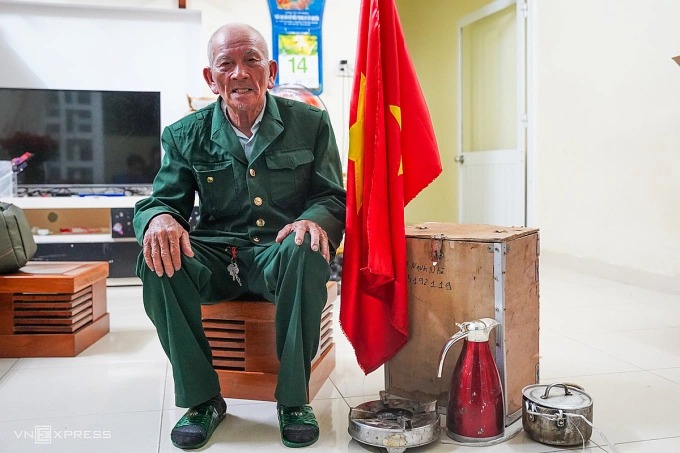 |
Veteran Tran Van Thanh with his belongings on his journey from Vinh City (Nghe An) to Ho Chi Minh City to watch the parade on 30/4/2025. Photo: Bui Toan |
Veteran Tran Van Thanh with his belongings on his journey from Vinh City (Nghe An) to Ho Chi Minh City to watch the parade on 30/4/2025. Photo: Bui Toan
The family of Nguyen Trang, from Kim Lu village, Pham Ngu Lao commune, Hung Yen province, is equally distraught as her 87-year-old grandfather, veteran Le Nguyen Phuc, wants to go to Hanoi for the September 2nd event.
Mr. Phuc, who fought in the southern battlefield, has always yearned to witness the troops marching through Ba Dinh Square. For nearly a month, he's been asking his family about the plans, saying he wants to go "on behalf of his fallen comrades" as this might be his last chance.
The family's biggest concern is the lack of an invitation and his health. "The journey from Hung Yen to Hanoi, combined with the waiting and navigating through crowds, is a significant challenge for an 87-year-old," Trang explained.
She also mentioned that her family had submitted a request for an official invitation through the commune's veterans' association, but the complex procedures and high number of applications yielded no results. Now, the family hopes organizations and event planners will arrange suitable seating for Mr. Phuc and other elderly veterans nationwide.
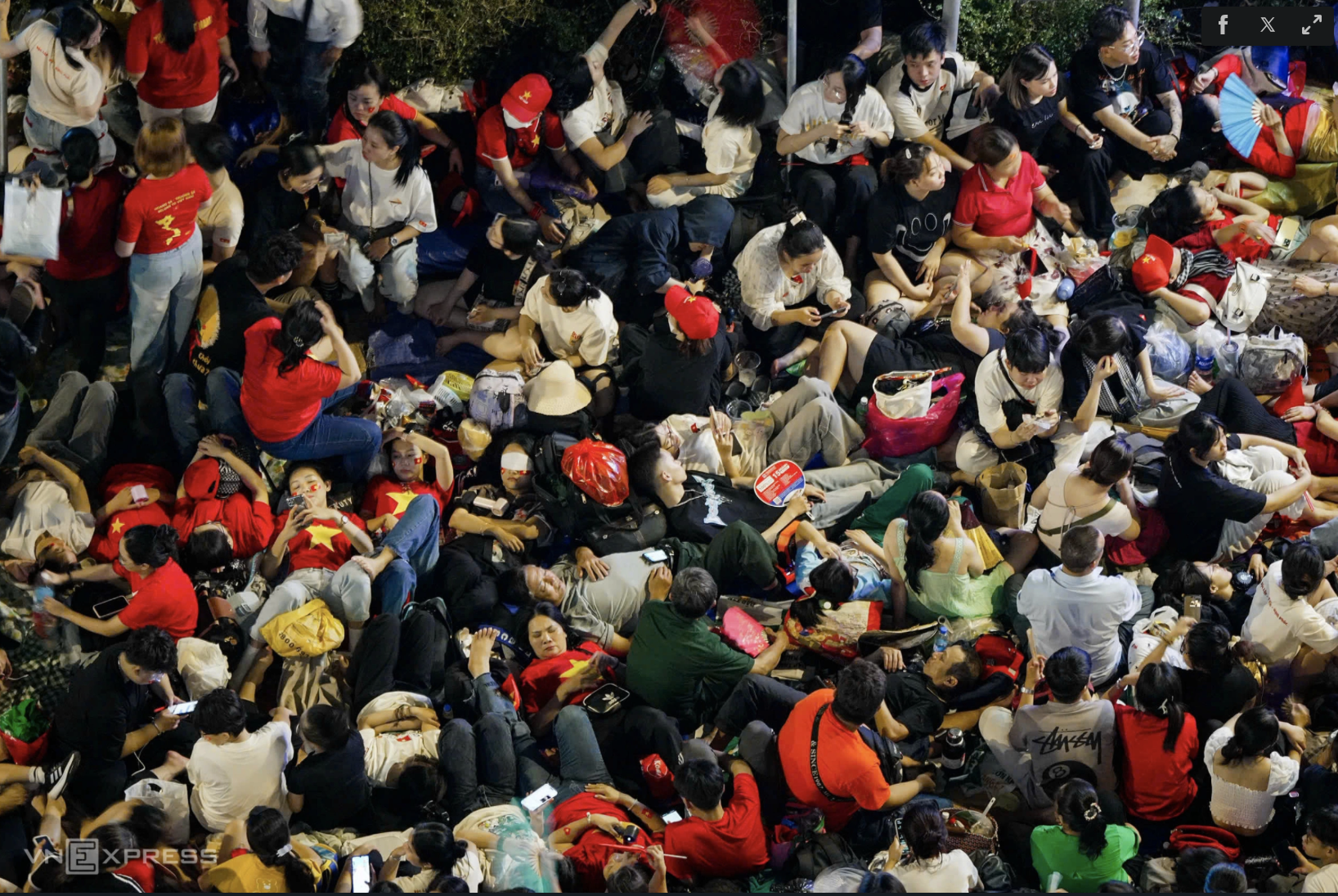 |
Citizens and veterans spread mats and tarpaulins on Ton Duc Thang Street, Ho Chi Minh City, on the night of 29/4, waiting to watch the parade the next morning. Photo: Quynh Tran |
Citizens and veterans spread mats and tarpaulins on Ton Duc Thang Street, Ho Chi Minh City, on the night of 29/4, waiting to watch the parade the next morning. Photo: Quynh Tran
The issue of seating arrangements for veterans at the parade has garnered significant public attention, sparking heated online discussions over the past few weeks. Some cited the incident of two veterans being disrespected by young people during the 30/4 parade, arguing that assigned seating could prevent such unfortunate events.
This has led to divided opinions. Some understand the organizers' challenges due to limited seating and urge public empathy. Others believe accommodating veterans is the most practical way to show gratitude. "They don't need to be in the central stands, just a designated area where they can sit comfortably and respectfully," one commenter suggested.
According to psychologist Nguyen Thi Tam (Ho Chi Minh City), veterans' determination to attend the parade stems from deep-seated psychological reasons.
In their twilight years, each major national event may be their last, prompting a desire to participate. It's also an opportunity to relive heroic memories, reaffirming the value of their sacrifices and those of their comrades.
"For soldiers, the military and the battlefield are a part of them. Watching the parade is a way to see how their glorious past contributed to the nation's present splendor," Ms. Tam said.
Furthermore, many feel obligated to witness the nation's joyous occasions on behalf of fallen comrades, fueling their resolve to attend.
Given this situation, the expert suggests finding a balanced solution that acknowledges veterans' sentiments and families' concerns about their elderly relatives enduring long waits and crowds in the heat.
Associate Professor Dr. Bui Thi An, President of the Hanoi Women Intellectuals Association and former National Assembly delegate (13th term), believes organizers should consider veterans' families' wishes. Dr. An acknowledges that accommodating all veterans in the 30,000-seat stands at Ba Dinh Square is impossible, given the country has around 3 million veterans.
However, solutions exist. Instead of relying on spontaneous family registrations, she suggests organizers collaborate with veterans' associations at all levels to identify those who desire to attend and are physically capable. Based on this, they could establish priority viewing areas like auxiliary stands or designated seating sections with safety measures along the parade route, supported by medical personnel and volunteers.
Another effective solution is utilizing existing infrastructure by working with central districts to organize live television viewings at cultural centers and auditoriums. This approach ensures veterans' safety and comfort in a cool environment while maintaining the ceremony's solemn atmosphere.
The families of Minh Yen and Nguyen Trang don't expect their relatives to have prominent seats at Ba Dinh Square on September 2nd. "As long as they have a safe place to watch the entire ceremony without having to jostle in the crowds, that's our only wish," Yen expressed.
Quynh Nguyen








